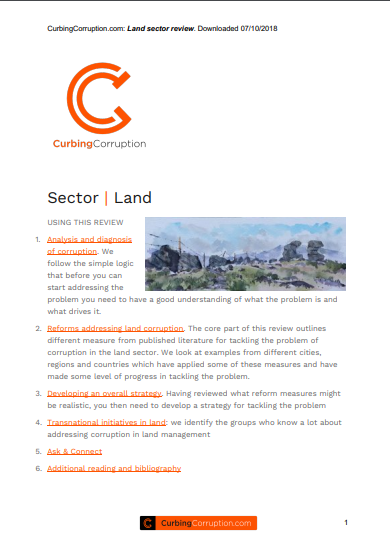Resource information
Land is consistently ranked among the sectors where people most often report having to pay bribes to access services, according to Transparency International’s Global Corruption Barometer. The Land Portal has summarised the latest available (dated 2013) global data here, which shows that the incidence of bribes paid for land services can be over 50% in countries such as Cambodia, India and Pakistan.
Tackling corruption in the administration and processes for land management is a critical area for reform because of its broad impact on socioeconomic development. The Food and Agricultural Organisation (2009) summarises the consequences of not addressing this problem and why it matters: ‘Weak (land) governance has adverse consequences for society…. Weak governance in land tenure tends to flourish where the law is complex, inconsistent or obsolete, where people who work in land agencies lack motivation and are poorly trained and paid, or where decision-making processes are opaque and civil society is weak. Left unaddressed, land-related grievances can degenerate into violence and conflict’
At the same time, implementing reforms in land management is one of the most challenging areas for a country or organisation’s anti-corruption programmes. The problem of corruption in the sector illustrates well the political challenges associated with bringing about change to strongly rooted societal structures as well the technical capacity needed to deliver reforms. Unambiguous political support and technical capability are often precisely the things that are lacking in the societies worst affected by this problem.
The review primarily looks at the land sector in developing countries, where the problems tend to be most severe and the most guidance on curbing corruption issues is available. Corruption in the land sector is equally a problem in developed countries; it simply takes a less visible form. Developed countries can also provide some excellent examples of reforms implemented in practice. You will therefore find reform examples throughout the review covering both developed and developing countries.

